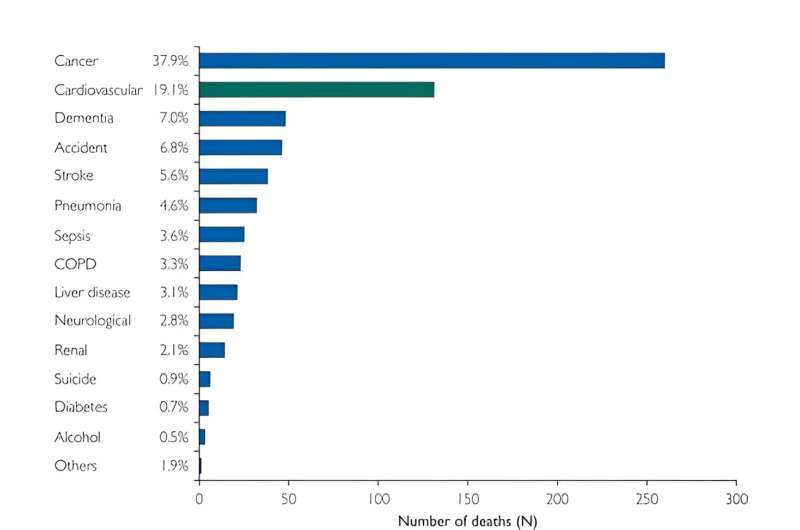This article has been reviewed according to Science X's editorial process and policies. Editors have highlighted the following attributes while ensuring the content's credibility:
fact-checked
peer-reviewed publication
trusted source
proofread
Stress test abnormalities reveal more than just cardiovascular risks, study finds

The treadmill exercise test with electrocardiogram (ECG), also known as an exercise stress test, is one of the most familiar tests in medicine.
While exercise testing typically is focused on diagnosing coronary artery disease, a recent study from Mayo Clinic finds that exercise test abnormalities, such as low functional aerobic capacity, predicted non-cardiovascular causes of death such as cancer in addition to cardiovascular-related deaths.
These new findings are published in Mayo Clinic Proceedings.
The exercise stress test is noninvasive, easily available and provides important diagnostic information. In addition to the ECG itself, the test produces data on functional aerobic capacity, heart rate recovery and chronotropic index, the standardized measure of heart rate during exercise that reflects age, resting heart rate and fitness.
"In our exercise testing cohort, non-cardiovascular deaths were more frequently observed than cardiovascular deaths," says Thomas Allison, Ph.D., M.P.H., director of Mayo Clinic's Integrated Stress Testing Center and the study's senior author.
"Though this was a cardiac stress test, we found that cancer was the leading cause of death, at 38%, whereas only 19% of deaths were cardiovascular. Exercise test results including low exercise capacity, low peak heart rate, and a slow recovery of the heart rate after exercise test were associated with increased mortality."
The study looked at 13,382 patients who had no baseline cardiovascular issues or other serious diseases and who had completed exercise tests at Mayo Clinic between 1993 and 2010, then were followed closely for a median period of 12.7 years.
The findings suggest that clinicians should focus not only on ECG results but on data in the exercise test results such as low functional aerobic capacity, low chronotropic index and abnormal heart rate recovery. Patients should be encouraged to increase their physical activity if these results are atypical, even if the ECG results show no significant cardiovascular-related risk, Dr. Allison says.
More information: Exercise Test Predicts Both Noncardiovascular and Cardiovascular Death in a Primary Prevention Population, Mayo Clinic Proceedings (2023). Nóra Sydó et al, Exercise Test Predicts Both Noncardiovascular and Cardiovascular Death in a Primary Prevention Population, Mayo Clinic Proceedings (2023). DOI: 10.1016/j.mayocp.2023.05.029




















